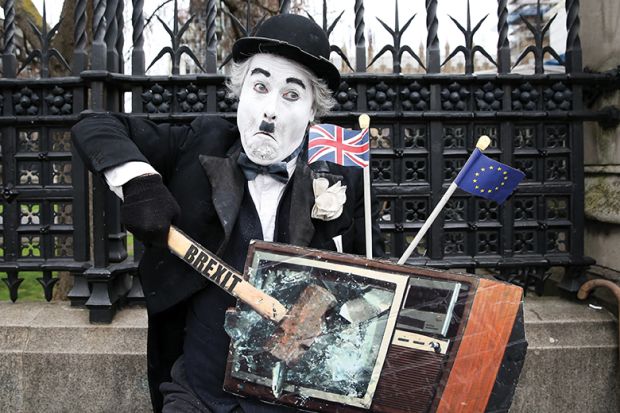The UK and the European Union are “breaking their promise” on continuing research collaboration post-Brexit and must stop using the issue as a “bargaining chip” in wider ructions over the Northern Ireland protocol, university leaders said.
Continued delays over agreeing the UK’s participation in the EU’s Horizon Europe research programme, already under way, could strengthen the hand of those in Westminster who were “never that enamoured” about joining, one UK sector figure also cautioned.
The EU’s summary of the Brexit withdrawal agreement, struck with the UK last December, says it “enables the UK’s continued participation in a number of flagship EU programmes for the period 2021-27 (subject to a financial contribution by the UK to the EU budget), such as Horizon Europe”.
But there has been little progress in reaching an association deal since then, leading to fears that the issue had been dragged into the wider EU-UK stand-off over the Northern Ireland protocol – with the EU unwilling to progress association until the protocol issue is resolved.
Mariya Gabriel, European commissioner for research, has appeared to make that link explicit, telling Science Business recently: “Association is a thematic subject, and I am confident that we are ready to tackle it as soon as possible, but transversal issues need to be tackled first.”
The delay has prompted concern among Dutch and German universities, two of Europe’s leaders in research alongside the UK.
“My call to the national and European politicians: act in respect of global interests instead of making research and innovation a bargaining chip,” said Pieter Duisenberg, president of the Association of the Universities in the Netherlands (VSNU).
“Our research partnerships with the UK are numerous and crucial. During the Brexit negotiations both EU and UK politicians made a promise to the research community on continued collaboration but they seem to be breaking this promise. This is incomprehensible and short-sighted in the light of the importance of global collaboration in research and innovation.”
Peter-André Alt, president of the German Rectors’ Conference (HRK), said that the EU and UK “should urgently ratify the necessary framework agreements to lay the foundations for a fast and successful association”.
“The months-long deadlock generates unnecessary uncertainty in European science and jeopardises joint projects that would contribute to the benefit of the European continent and the world,” he said.
Vivienne Stern, director of Universities UK International, said Ms Gabriel’s comments confirmed that the “delay in progress is political”.
“At least it makes it clear it’s not that we [the UK] have gone off the idea…It’s that the commission has chosen to make Horizon a bargaining chip,” Ms Stern said.
Responding to Ms Gabriel’s comments, UK science minister George Freeman tweeted that the UK’s “longstanding commitment [and] offer to stay in Horizon stands” but that if the commission decided the country could not join until the issue was settled the Westminster government had a “Plan B”.
UUK’s message to UK researchers was “apply, apply, apply” for Horizon Europe funding, Ms Stern stressed.
But she also warned: “The longer this goes on the higher the risk that people in the UK government who were never that enamoured of association start getting the upper hand in the argument.
“Of course, there are conversations going on about [UK-based] alternatives. The longer this goes on and the more obviously it is linked to the Northern Ireland protocol, the more difficult it is to persuade people to be patient.”
Register to continue
Why register?
- Registration is free and only takes a moment
- Once registered, you can read 3 articles a month
- Sign up for our newsletter
Subscribe
Or subscribe for unlimited access to:
- Unlimited access to news, views, insights & reviews
- Digital editions
- Digital access to THE’s university and college rankings analysis
Already registered or a current subscriber? Login








